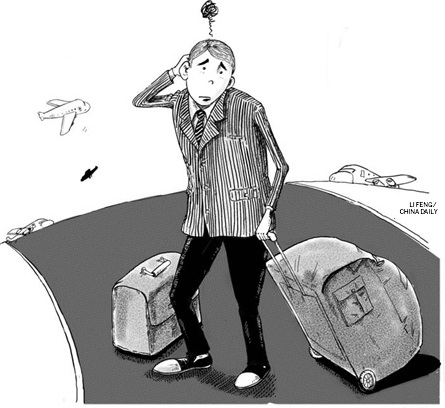Op-Ed Contributors
Debate: Brain drain
(China Daily)
Updated: 2010-07-12 07:53
 |
Large Medium Small |

Is the emigration of Chinese a drain on the country's human resources? Two scholars, a foreigner and a Chinese, enlighten us with their views.
Xu Youyu
Social justice can reverse the flow
The emigration of an increasing number of the social elite from China in the past decade has drawn the attention of the media, the government and the public alike.
Emigration and immigration are an obvious outcome of globalization, and were expected to increase in China after the reform and opening up. So, are the media and public overreacting to the emigration of Chinese people in the past 30 years, especially because the first three decades of the People's Republic of China saw almost no flow of people across the borders? The answer is "no", because emigration over the past 10 years has been really high and has special implications on the country.
To be honest, China has seen an inflow of talent, too. Most people can be classified into two categories. Many of them are Chinese with a degree from universities abroad and the experience of working in foreign countries. They, at least a majority of them, return home in search of greener pastures in a more familiar environment. The other group comprises entrepreneurs from Taiwan and Hong Kong, who have shifted to the Chinese mainland, attracted by the favorable policies its local governments offer and the lure of making greater profits by exploiting its cheap labor.
In this sense, the flow of manpower has been a two-way traffic for the mainland, indicating that the country is catching up with the developed nations and regions in terms of the economy, social development and living standards. Chinese citizens and foreigners both may be benefiting from the increasing freedom to move across borders, but we should not forget that members of neither group are eager to change their citizenship, for they migrate in search of better opportunities.
In contrast, most of the Chinese emigrants are too eager to change their nationality or at least strive to get a long-time residency permit from the government of the country they migrate to.
A remarkable difference between this generation of emigrants and those who emigrated in the 1980s is that the first group was trying to look for better working and living conditions. But most of the new generation of emigrants represent the so-called successful class and already enjoy a much higher social status at home. Such people opt to emigrate for the lure of the West even if they have to start life anew.
This means China's elite are ready to sacrifice the comforts they enjoy at home in exchange for the citizenship of a foreign country. Such people choose to do so mainly because they don't believe their country's legal system, because of its uncertainties, cannot guarantee them a "successful and peaceful" life.
Apart from a sense of security, the Chinese elite also emigrate in search of better living environment and world-class education for their children. And so enamored are they by everything Western that they fail to see the prosperity and stability they could get back home in the long run, and are ready to trade the comforts they enjoy at home for the lure of a rosy future abroad.
Such a brain drain is bound to harm China's economic construction and modernization, because the elite' knowledge, innovativeness and creativity, and funds are valuable resources to build a better future. The emigration of such people robs China of not only valuable manpower, but also the resources they have.
More importantly, their emigration is a loss of collective confidence, especially because the elite are setting a bad example for their less-privileged countrymen by disregarding the needs of the country in exchange for the mundane benefits of everyday life. The flight of the elite thwarts the country's modernization process, too. Hence, it is doubly sad to see local governments not doing enough to contain this flow.
The increase in the number of elite emigrants is a rude reminder that the government has to reform the legal system. It is important to establish the rule of law not only to retain the elite in China, but also to ensure that the rights of the underprivileged are well-protected.
The government has to cleanse the bureaucracy of corruption and see to it that the grievances of all citizens, irrespective of their social status, are redressed.
It has to establish a clean and honest police administration and independent judiciary so that people can rely on their intelligence and hard work, rather than bribes and guanxi (connections), to succeed in life.
What kind of society do we need? The government should be worried over the emigration of the elite and loss of social resources. But it should not just try to attract as many outstanding talent as possible to help the country build a better future.
Moreover, since the common people are not inferior to the elite, offering favorable policies only to the latter would be unfair.
The elite are already an advantaged group because of the money, knowledge and privileges they enjoy. The government should thus focus more on the lower strata of society.
Justice is the source of confidence. A just society is what people will be emotionally attached to. And that applies to all citizens, whether they are the elite or the common citizens.
The author is a research scholar with the Institute of Philosophy, affiliated to the Chinese Academy of Social Sciences.